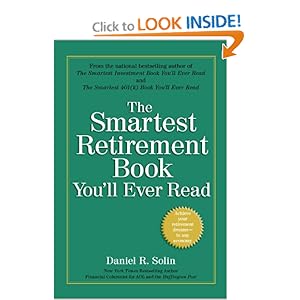 Review by Christina Nevins, Esq., Boynton Beach, Florida
Review by Christina Nevins, Esq., Boynton Beach, Florida
Book by Daniel R. Solin
Let me first say that I don’t usually enjoy reading financial planning books. Don’t get me wrong. I do read them, because I know that I need the information contained in them. I just don’t enjoy the process, finding that many are bogged down with too much information and a host of unpronounceable acronyms. Having said that, I found Daniel Solin’s book, The Smartest Retirement Book You’ll Ever Read, to be a refreshingly easy to understand and well written book.
Solin covers a lot of territory, presented in 14 sections containing several very short chapters each. Topics covered range from the shockingly large bite inflation can take out of your nest egg over time, to when to retire and begin drawing Social Security, to irrevocable trusts, and even to prenuptial agreements for seniors. Each topic is covered in concisely written, surprisingly thorough chapters. Most of the chapters are only one-and-a-half to two pages, making for a quick read. Solin supplements these chapters with a section in the back of the book that provides, chapter-by-chapter, references to web sites and other resources for further independent research.
The book is, for the most part, written for those individuals who are already retired or about to retire and have enough resources to be able to invest some and still have ready cash on hand for daily expenses. For example, Solin recommends keeping 2 years’ worth of expenses in readily available money market accounts while investing the rest in a combination of stocks and bonds. Certainly, for many retirees, doing so is simply not a realistic option. The majority of the book assumes that you’ve got a substantial nest egg and just need to know what to do with it. At one point, Solin refers to a $100,000 investment as a “cheap” investment, a statement that might turn some off to his advice, thinking that they simply do not have the resources to implement his otherwise sage advice. (Solin does, however, provide a short section entitled “Financial Lifelines for Desperate Times,” in which he discusses what to do if the worst happens and your nest egg runs out before you do.)
Solin’s credentials are excellent. He is the author of two other very well received books, The Smartest Investment Book You’ll Ever Read and The Smartest 401(k) Book You’ll Ever Read. (Sensing a theme here?) He also writes a financial advice column for the Huffington Post and a contributor to AOL’s DailyFinance. Solin’s confidence in his skills comes out clearly in the book: “you need ” this and “you don’t need” that are the kind of definitive word choices he uses when doling out his advice. For some this certainty of opinion may be off-putting; for others, however, it may be reassuring as it gives clear direction on what to do and what not to do.
Overall, I think that this is an excellent book to keep in the finances section of your library. It covers a lot of subjects very well and provides a springboard to further research in the ones that are particularly relevant to your individual situation. I still may not “enjoy” reading books like this, but with this one, at least, I learned a lot of very valuable information that I will keep in the back of my mind for when the time comes for me to retire.


